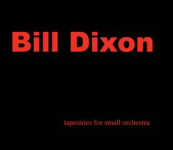|
|
 |
Dusted Reviews
Artist: Bill Dixon Album: Tapestries for Small Orchestra Label: Firehouse 12 Review date: Jan. 4, 2010 |

|
|
|
 |
That Bill Dixon’s music has been lumped in with free jazz says more about the inadequacy of musical taxonomy than anything else. Maybe it’s because he is a black man who plays trumpet and solicits improvised responses from his fellow musicians, or because of his associations in the 1960s with Archie Shepp and Cecil Taylor, or his recent release on AUM Fidelity. But the sigh and groan of strings, the winding trumpet and contrabass clarinet lines, and the strategic percussion adornment of “Motorcycle ’66: Reflections & Ruminations,” which opens this double CD set (and appears twice on the accompanying DVD) have more in common with 20th century classical music. Which is something one also could say of Intents and Purposes, his landmark 1967 recording for RCA, which has never received a CD release.
Say this for the guy – he’s consistent. Taken together, the titles of that 42-year-old album and Tapestries for Small Orchestra say more than any imposed label about Dixon’s music. He is concerned with the complexity of sounds, by themselves and in concert with other sounds. His music draws a variety of colors and threads together to impart complex meanings. And it is essential to reckon with the intentions that motivate each sound’s manufacture, since the intentions and purposes are part of the sound.
Which is not to say that Dixon’s meanings are easily decoded. It’s not readily apparent what motorcycles have to do with a series of low, woody tones folding into each other and then angling away whilst being peppered by trumpet blasts and brightened by brief vibraphone phrases. But the way they cohere feels enormously significant. This is one of the challenges of Dixon’s work; it isn’t shy about declaring its own significance. But when Dixon’s own trumpet voice, pithy and wreathed in reverb, dances with low bowed strings and more emphatic mallet work on “Slivers: Sand Dance For Sophia,” it speaks with such authority that I’m inclined to agree. Yeah, this stuff matters. It matters because, in its dark and private way, it is very beautiful.
Part of that beauty comes from the elegance of Dixon’s framing. He gives each element room to move, and each personal/instrumental combination enough space for their interactions to be clearly perceived. Open space is a constant in Dixon’s music. Despite the size of the band on Tapestries (which includes Michel Côté on bass and contrabass clarinetist, cellist Glynis Lomon, bassist Ken Filiano, percussionist Warren Smith, and Rob Mazurek, Stephen Haynes, Graham Haynes, and Taylor Ho Bynum on cornets and trumpets), each contribution stands out so clearly that this music sounds even more transparent than that of Vade Mecum and Papyrus, the multi-volume recordings for two-to-four musicians that Dixon made during the 1990s. It certainly doesn’t hurt that most of the players on Tapestries have studied with Dixon. Each part, no matter how small, is played with conviction and sensitivity so to fit into the bigger picture.
Both their commitment and the independent thought they’ve put into grasping Dixon’s music comes through in the documentary section of the DVD. But while it’s handy to hear them and Dixon discussing what they’re doing, it’s more helpful to see them doing it. Closely and clearly shot, the performance segments that intersperse the interviews and the four complete in-studio performances that follow them are far more illustrative of the individual and collective effort that goes into realizing Dixon’s music.
By Bill Meyer
|







